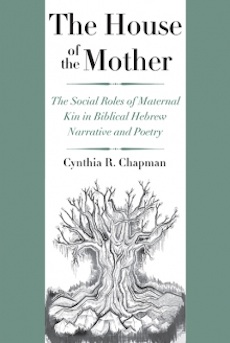By Lewis Fried
This is a welcome book, synthesizing a vast amount of scholarship, as well as exploring relationships whose full import at first may often evade the reader. One of its major tasks, and well done, too, is uncovering the struggle elided over by “begats” and illuminating the formulaic rhetoric of genealogies. Chapman focuses on maternal kinship patterns and their narrative import in a text invariably seen as patriarchal and patrilineal. The House of the Mother reveals the turbulence, and its resolution, found within the web of kin that genealogies convey. Bringing an anthropological concern to this study, she exposes how narration, rhetoric, and family ties intertwine so that the culture of the “mother” is found in domestic, national, and by implication theological cultures of Hebrew Scripture.
Feminist-centered studies have been invaluable in understanding the complexity of seemingly simple lineal generation; such investigations have re-ordered what we often took as overarching lines of genealogy determined by the “father” and shown how labile, and how complicated, kinship is. As a result, we have a sense of contest and disruption. (What becomes even more fascinating is how and why the textual redactors decided to keep alive, if not energize, matrilinear influence.) Given such a project, Chapman, no incautious writer, indicates when some of her conclusions may be suggestive, when they remain provocative, and when they are inevitable.
As she puts it, remaining respectful of “indigenous terminology,” her book offers “new or emended definitions” for crucial Hebrew descriptors, such as “house”; “house of the mother”; “my brother, the son of my mother”; “son of my womb”; “a brother who nursed at my mother’s breasts”; “the womb-opener”; and “the house of the father of my mother.” These terms disclose an individual who is more than a self: rather, someone within a kinship web connecting ideals, expectations, family histories, and fortunes. Moreover, the terms are narrators’ investments in the historical importance of successes and marginalizations.
So, we can ask what exactly is a house (or bayit, in Hebrew). Much more than a physical dwelling, the term includes those who lived within it, their differing statuses, those who would inherit and those who would not—in other words, the working context and content of a family. It is a “nested entity” much like a unit within a larger one. So described, bayit presents “multiple social groupings.” These arrangements, Chapman suggests, were comprehensible to the Israelites; the kinship groupings “specific to a polygynous household” were understood by those who lived in a nuclear family.
The “house of the mother” (bet ‘em in Hebrew), a designation that is found only four times in the Bible, is a “social and spatial subunit” within the house of the father. It is a “uterine unit,” involving the authority and aspirations as well as comfort of the mother. Chapman describes it as a space in which family members can converse, host guests, offer lodging, and even negotiate a marriage. The bet ‘em, if that of a wife of lower status, is a “satellite house” in relation to the house of the father, and physically apart from such. In larger terms, the house of the mother constitutes the resources for a successor, an heir.
How is kinship established? Is it based on the polygynous family or a single “uterine” unit, or do the above-quoted descriptors point to even more complex statuses and relations? A good case example is “breast-milk.” Examining several tales in which breast-feeding and milk play important roles, Chapman concludes that such gave “sons tribal identity, royal or priestly status, and in some cases ritual purity.” It is the mother that helps confer the ties of allegiance and loyalty within her “maternal clan.” Chapman is especially good at teasing out the implications of this: the mother’s status constructs the stage in which the rise to heirship is seen, narrated, and contested.
Given interpretations that are often strong, from the pronounced to the markedly nuanced, Chapman helps reconfigure the strength of the “house of the mother” relative to the fate of its heirs. Those who read her book will come away with a larger (if not revolutionary) understanding of the dynamic social patterns, power, and values found within recitations of kinship within the Bible.
Lewis Fried (ΦBK, Queen’s College, CUNY, 1964) is Professor of English Emeritus at Kent State University and a resident member of the Nu of Ohio Chapter of Phi Beta Kappa.




